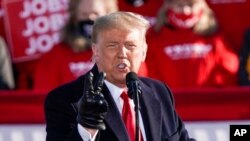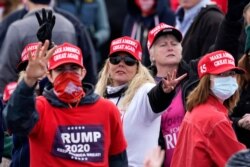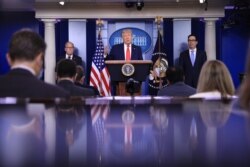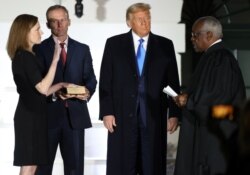U.S. President Donald Trump is facing headwinds as he attempts to win re-election on Tuesday, trying to keep from becoming the third American leader in the last four decades to lose after a single term in the White House.
Trump trails Democratic challenger Joe Biden by roughly 8 percentage points in cumulative national polling, but less so in key battleground states that will determine the outcome of the election.
After recovering in early October from contracting the coronavirus that has killed more than 230,000 Americans, according to Johns Hopkins University, the 74-year-old commander-in-chief has campaigned relentlessly in battleground states including Florida, Michigan and Pennsylvania. Trump has sometimes hop-scotched to three or more states in a day to greet cheering throngs wearing his trademark red and white “Make America Great Again” caps.
Trump’s supporters recall that he also trailed Democrat Hillary Clinton late in 2016 before he unexpectedly captured three northern, traditionally Democratic states — Pennsylvania, Michigan and Wisconsin — and a four-year term in the White House.
Trump declared at a mid-October rally in Wisconsin that he can do it a second time, saying, “We’re not going to lose, we’re going to win.”
But he also mused about the distinct, opposite possibility, saying, “If I lose, I will have lost to the worst candidate, the worst candidate in the history of presidential politics. If I lose, what do I do? I’d rather run against somebody who’s extraordinarily talented, at least, this way I can go and lead my life.”
Whatever his political fate, Trump has delighted in drawing thousands of supporters to outdoor rallies, attempting to replicate his campaign trail successes from four years ago.
He most often has appeared without a face mask, ignoring the advice of health experts amid the country’s unchecked coronavirus pandemic, and the vast majority of his supporters have cheered him on without face coverings either.
In 2016, Trump was best known as a real estate tycoon and television reality show host and a novice politician. Now, he has a four-year term as president to defend, with the coronavirus pandemic the single biggest issue even as Trump has attempted to steer the discussion to the country’s improving economy after it was decimated by the virus.
He boasts of the country’s five-decade-low unemployment rate of 3.5% before what he calls the “China virus” invaded U.S. shores, and says he can restore the economy again. On Thursday, the U.S. Commerce Department reported that the gross domestic product grew by 7.4 percent in the third quarter, the fastest pace on record.
While Biden has relentlessly attacked Trump’s handling of the pandemic as chaotic, uncaring and erratic, the president tells voters that the country has “turned the corner” on dealing with the pandemic.
But the number of infections in the U.S. has surged again, with sometimes 90,000 and more testing positive daily.
Government researchers and private drug companies say they are closing in on development of a vaccine that might be ready in the coming weeks. But no vaccine has been approved yet and won’t be by Election Day, which Trump weeks ago frequently said was possible.
Trump was viewed by many voters as something of a political unknown when he sought the presidency in 2016, but one worth taking a chance on, even as numerous pundits and pollsters thought he surely would lose the national election.
Against the norms of Washington, he has often chosen to govern via social media, serving up acerbic Twitter remarks targeting political foes and making policy on the fly.
Supporters have extolled him as bold and innovative, crediting him with restoring an “America First” credo across the globe, while moving toward a less regulated state of life within the U.S. by signing dozens of executive orders limiting governmental oversight and control.
The Trump administration claims successes over the last 3 ½ years — a massive tax cut benefiting American businesses and individuals, a partial trade agreement with China, construction of part of a wall along the Mexican border to curb illegal migration (although Mexico didn’t pay for it as Trump claimed it would) and new diplomatic relations between the Jewish state of Israel and a handful of its Islamic neighbors.
He has won Senate confirmation of three conservative judges he named to lifetime appointments on the Supreme Court, cementing a 6-3 conservative majority that could affect American law on abortions, health care, immigration, gun rights, election law and other issues for decades.
Critics complain Trump has strained relations with traditional U.S. allies in Europe and Asia while cozying up to authoritarian rulers like Russia’s Vladimir Putin, China’s Xi Jinping and North Korea’s Kim Jong Un.
Republican stalwarts have attempted to portray Trump as decisive in handling the coronavirus, citing him for curbing entry of some travelers from China in early 2020 after the initial virus outbreak in Wuhan.
But Trump has voiced constant skepticism of the virus’ lethality and its effect on the U.S. In a clip from a television interview in late February that is often replayed on news programs, Trump predicted the coronavirus was “going to disappear.”
“One day, it's like a miracle, it will disappear," he said.
Asked a couple months ago to assess the U.S. death toll, Trump replied, “It is what it is.”
Numerous polls show the U.S. public disapproves of Trump’s handling of the pandemic. But now the key election question for Trump is whether that sentiment translates into voters ousting him from office or whether his other successes merit another term in the White House.







